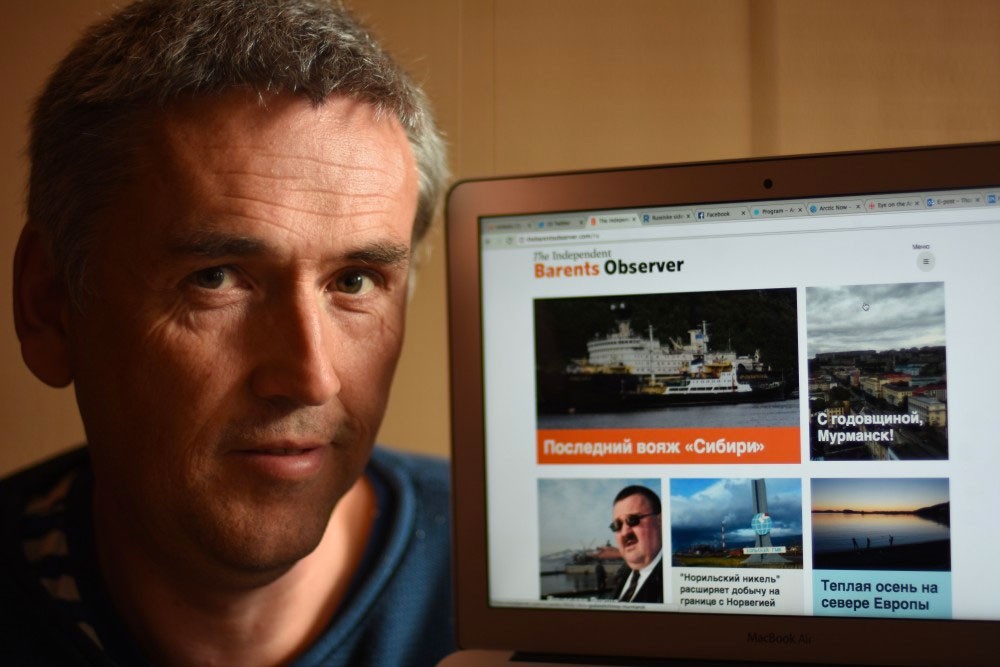
Bellona Launches Oslofjord Kelp Park
Bellona has launched the Oslofjord Kelp Park, a pilot kelp cultivation facility outside Slemmestad, about 30 kilometers southwest of Oslo, aimed at r...
News

Publish date: May 30, 2018
News
A Norwegian newspaper editor has lost a Kafkaesque case before Russia’s Supreme Court where he sought to challenge a travel ban imposed on him by Russia’s security services, which have said he cannot enter the country for the next five years.
The editor, Thomas Nilsen, was in refused entry to Russia in March of 2017 after being designated a “security risk” by the shadowy Federal Security Service, or FSB, for reasons the service refused to divulge for reasons of secrecy.
Nilsen, a past member of Bellona’s Russia group, now edits the bilingual online Independent Barents Observer news portal published in Kirkenes, Norway, and says his case is an effort by the Russian government to suppress free speech.
The government, however, is remaining mum. When Nilsen originally appealed the ban, first to courts in the border town where he was turned away, and later to the Moscow City Court, officials refused to tell him on what basis he was designated a security risk, saying the reasons were a matter of state secrecy.
Last week, Russia’s Supreme Court upheld that ruling, effectively saying that the FSB doesn’t have to tell Nilsen why he is such a risky person to have in the country, and supported his lock-out.
Amidst all of this put Nilsen and his lawyer Ivan Pavlov, a renowned human rights attorney, were in the absurd position of defending against allegations they were not allowed to see or challenge – a time-honored FSB tactic.
“The court once again refuses to show the materials on the basis of which the verdict has been made,” Pavlov said in a statement reprinted in the Independent Barents Observer. “Consequently, the Supreme Court sides with the FSB which argues that out client threatens Russian national security.”
Nilsen himself – who has spent the last three decades traveling to and from Russia for civil society and reporting purposes without raising any red flags – has not been allowed into Russia to speak on his own behalf. But he sees the ban as a clear attempt by the government to shut him and other journalists up.
“The ruling of the Supreme Court actually means that the FSB can filter which foreign journalists can report in and from Russia,” he said in a statement on his portal. He added that during his years of reporting on the country, harassment from the FSB has been a routine feature of his job.
On his portal, Nilsen and his colleagues cover issues of cross border cooperation between Norway and Russia, and their reporting has often raised hackles on both sides of the divide.
The portal routinely writes on pollution emanating from Russian industry on the Kola Peninsula, Arctic oil exploration, Moscow’s pursuit of so-called “foreign agent” civil society groups, as well as the ongoing saga of nuclear waste produced by the Russian Navy’s Northern Fleet.
Still, officialdom on both sides of the border has attempted to squelch the portal, at one point making it the focus of a backstairs flap between Norwegian government and the FSB. At that time, Norwegian officials overseeing the paper had pressured Nilsen and his staff to dull their editorial edge.
But Nilsen refused. He and his staff left the paper, later reopening it and placing its ownership in the hands of its journalists. It was later suggested by a report on Norway’s NRK national broadcaster that the FSB had been pressuring the Norwegian officials responsible for overseeing the paper, though Nilsen himself was unable to corroborate that.
As surprising as the travel ban was to Nilsen, his acquaintance with FSB hostilities is a long one. During his tenure with Bellona, he was deeply involved in the defense of Alexander Nikitin, the Bellona expert from Russia who in 1995 was charged with treason for his contributions to the organization’s report on radioactive waste handling in the Russian Navy.
Russia’s Supreme Court acquitted Nikitin in 2000, but Nilsen and other Bellona staff who co-authored the report were targeted with visa rejections while they worked on Nikitin’s defense in 1996.
Still, being banned from Russia might not be the worst thing for a journalist. Press freedom rating compiled by Freedom House, an international watchdog, consistently rate Russia as one of the most dangerous places in the world for reporters.
Since Vladimir Putin has come to power, the media rights group says 34 journalists have been murdered for the drift of their coverage, ranking Russia behind Sudan, Iraq and the Democratic Republic of Congo in terms of safety for independent reporters.

Bellona has launched the Oslofjord Kelp Park, a pilot kelp cultivation facility outside Slemmestad, about 30 kilometers southwest of Oslo, aimed at r...

Our November Nuclear Digest by Bellona’s Environmental Transparency Center is out now. Here’s a quick taste of just three nuclear issues arising in U...

For three years now, Bellona has continued its work in exile from Vilnius, sustaining and expanding its analysis despite war, repression, and the collapse of international cooperation with Russia in the environmental and nuclear fields

The Board of the Bellona Foundation has appointed former Minister of Climate and the Environment Sveinung Rotevatn as Managing Director of Bellona No...